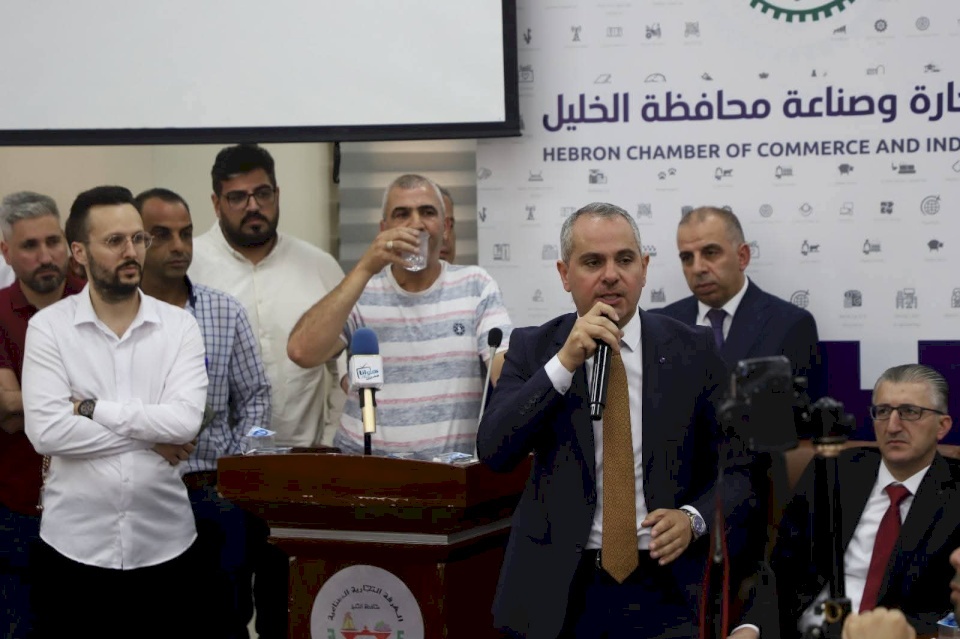
Idris Threatens Mass Resignation if Separation of Commercial and Industrial Chambers is Approved
SadaNews Economy Report - The Hebron Chamber of Commerce and Industry held a meeting in the city of Hebron, attended by the President of the Hebron Chamber of Commerce and Industry, and the President of the Federation of Commercial and Industrial Chambers, Abdu Idris, along with members of the general assembly of the Hebron Chamber of Commerce and Industry.
Hundreds of traders and industrialists demanded that the Palestinian Monetary Authority compel banks to implement the recently announced regulations regarding cash deposits, according to SadaNews's follow-up.
During the meeting, the general assembly of the commercial and industrial chamber expressed its rejection of any government direction to completely separate industry from the commercial industrial chambers, clarifying that the proposed separation contradicts the electoral contract under which the boards of directors of the commercial and industrial chambers were elected, some of which have been in existence for over a hundred years.
They considered that the separation would lead to the destruction of the Palestinian industry.
For his part, the President of the Industrial Commercial Chambers, Abdu Idris, threatened a mass resignation for the general assembly of all boards of directors of the commercial industrial chambers across Palestine (the West Bank and Gaza) if the separation is approved, according to observations made by SadaNews.
He clarified that "it is the right of the chambers to voice their opinions in all peaceful ways to save what can be saved".
Additionally, Tahrir Abidin, a member of the Hebron Chamber of Commerce and Industry, stated during the meeting that "they were elected before the responsible authorities according to the law, and thus, holding them accountable is illogical".
He continued: "Unfortunately, we have not received any response from any party we established relationships with and appealed to for them to fulfill their responsibilities".
Abidin also demanded the dismissal of the government, saying: "Let the government change because it is unable to carry its responsibilities; enough with the niceties at the expense of the country".
He added: "The Monetary Authority has closed 12 exchange shops and penalized 45 shops, knowing that the problem lies with the Ministry of Finance".
On his part, a gas station owner in Hebron stated that he incurred heavy losses as a result of the refusal of cash deposits, saying: "We in Palestine establish our companies with our blood and great difficulty, and thus the private sector must be supported", noting: "The private sector is supported in all countries of the world, except Palestine", warning that if the private sector is destroyed, the public sector will be destroyed along with it.
"The separation of commercial from industrial chambers is a complete integration that cannot be fragmented, and thus the separation is a crime against trade and industry as well," according to one of the attendees, calling for the general assembly members to resign immediately should the separation be approved.
The chambers emphasized the need to resolve the cash deposit issue, urging the Monetary Authority to bear its responsibilities in compelling banks to adhere to the pre-crisis ceilings, as well as to issue checkbooks without restrictions or new regulations, rejecting any partial or sectoral solutions to cash deposit issues and the banking sector.
They pointed to the losses incurred by traders and factory owners due to banks' refusal of cash deposits.
Regarding the Tarqumiya checkpoint, which is repeatedly closed by the occupation for extended periods, leading to congestion of goods, the assembly members demanded a resolution for this issue, in addition to the matter of stamping customs data.
They called for a reassessment of the post-audit mechanisms and the application of the new value-added tax law until agreement is reached on some disputed points.
They stressed the necessity of solving the water crisis in the Hebron area specifically and in the southern West Bank in general, due to its negative impact on the population, industry, and agriculture alike.

The Problem of Shekel Overcrowding Worsens.. Fuel Station Owners Threatened with Closure o...

The Palestinian Economy at a Crossroads: 4 Files Awaiting Resolution

25 million dollars total funds introduced for trading through licensed forex companies in...

The Monetary Authority and the Federation of Chambers of Commerce Discuss Economic Develop...

Monetary Authority: 20 billion dollars in checks circulated during 2025, of which 6.8% wer...

Palestinian Prime Minister Participates in Davos Economic Forum 2026

Wholesale prices of goods in Palestine record a sharp increase of 9.12% during 2025
